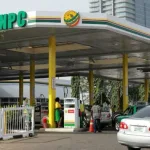Logistics Chain Disruptions
The Nigerian National Petroleum Corporation (NNPC) Ltd has addressed the recent fuel queues observed in the Federal Capital Territory (FCT) and other parts of Nigeria.
According to a statement issued on Monday by Chief Corporate Communications Officer Olufemi Soneye, the primary cause of these queues is disruptions in the logistics chain.
Join our WhatsApp ChannelThese disruptions have been compounded by adverse weather conditions and flooding.
Adverse Weather Impact
Soneye explained that a recent thunderstorm significantly impacted the ship-to-ship (STS) transfer of Premium Motor Spirit (PMS), commonly known as petrol, between mother vessels and daughter vessels.
“The adverse weather condition has also affected berthing at jetties, truck load-outs, and the transportation of products to filling stations, disrupting station supply logistics,” he said.
Safety Measures During Weather Events
Due to the highly flammable nature of petroleum products and in compliance with the Nigerian Meteorological Agency (NIMET) regulations, loading petrol during rainstorms and lightning is prohibited.
This precaution is necessary to ensure the safety of trucks, filling stations, and human lives. The NNPC emphasized that this safety measure is critical, especially during severe weather events.
READ ALSO: NNPC Faces Fuel Scarcity As Payment Backlog Of $6bn Mounts
Flooding Exacerbates Issues
Flooding of key truck routes has further complicated the movement of PMS from coastal corridors to the capital city, aggravating the supply chain issues.
These combined factors have led to significant delays in the distribution of petrol, resulting in the observed fuel queues.
NNPC’s Response
Despite these challenges, the NNPC assured the public that it is actively working with relevant stakeholders to resolve the logistical bottlenecks and restore the seamless supply of petrol to the affected areas.
“Loading has already commenced in regions where the weather has improved, and we are optimistic about restoring full normalcy in the coming days,” the statement read.
Public Advisory
The NNPC also urged motorists to refrain from panic buying and hoarding of petroleum products, as such actions could worsen the situation.
“We call on motorists to avoid panic buying and hoarding of petroleum products,” the statement concluded.
Collaboration with Stakeholders
As the NNPC collaborates with various stakeholders to address these challenges, the public remains hopeful for a swift resolution and the return of normalcy in fuel supply across the affected areas.
The corporation’s efforts are focused on mitigating the impact of logistical and weather-related disruptions to ensure a steady supply of fuel.
Looking Ahead
The NNPC’s commitment to resolving these issues highlights the importance of robust logistics and contingency planning in the petroleum sector.
The corporation’s proactive measures aim to minimize future disruptions and maintain a consistent supply of petroleum products across Nigeria.
As efforts continue, the NNPC remains dedicated to providing timely updates to the public and ensuring transparency in its operations.
The recent fuel queues in Nigeria are a result of compounded logistical and weather-related challenges. The NNPC’s swift response and collaboration with stakeholders underscore its dedication to resolving these issues and restoring normalcy in fuel supply.
The public is encouraged to stay informed and avoid actions that could exacerbate the situation, as the NNPC works towards a swift resolution.
Emmanuel Ochayi is a journalist. He is a graduate of the University of Lagos, School of first choice and the nations pride. Emmanuel is keen on exploring writing angles in different areas, including Business, climate change, politics, Education, and others.


















Follow Us